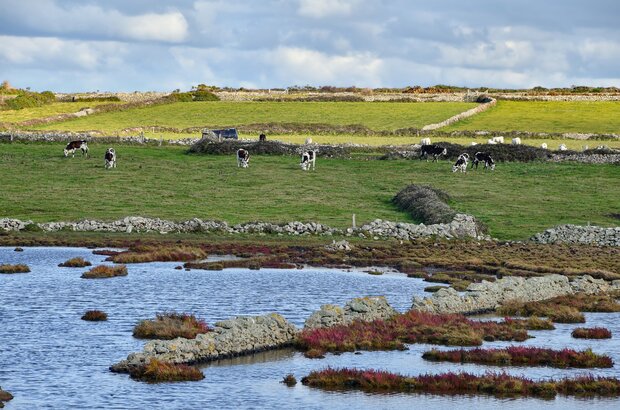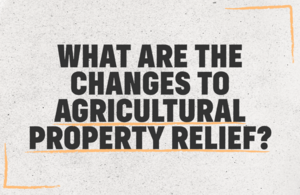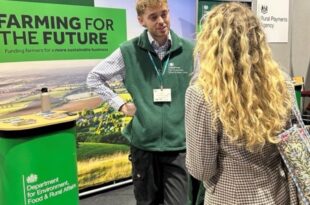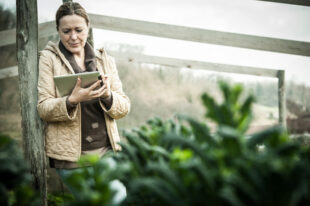
Today we published a blog post with news about our 3 environmental land management schemes and Countryside Stewardship payment rates. In that post, we explained how the 3 schemes fit together and the timings for them.
In this post, we'll share a bit more information about eligibility and what the schemes will pay for.
Local Nature Recovery
Local Nature Recovery will initially cover the following themes:
- managing feeding, shelter and breeding areas for wildlife on arable farms
- managing, restoring and creating grassland habitats, wetland habitats, coastal habitats and lowland heathland
- managing and restoring areas of upland and lowland peat and moorland on farms and in the wider countryside
- targeted measures to support the recovery and reintroduction of particular wildlife species and to tackle non-native invasive species.
- managing and creating trees and woodlands, noting that the England Woodland Creation Offer will be the main scheme for woodland creation at larger scale until 2025
- nature-based solutions for water – such as creating and managing in-field vegetation, buffer strips and swales to reduce and filter run off and contribute to improving water quality and water availability, and mitigating flood risk
- restoring rivers, flood plains, streams and riparian habitats
The scheme will cover some land management actions that are equivalent to Countryside Stewardship Mid Tier offers, as well as more tailored activities on sensitive sites that are similar to Countryside Stewardship Higher Tier or Higher Level Stewardship offers.
Local Nature Recovery will be open to farmers, foresters and other land managers.
Farmers will be able to enter Local Nature Recovery and the Sustainable Farming Incentive – so long as the actions they commit to in both schemes are compatible and we’re not paying for the same actions twice. Farmers will be able to build an agreement that really works for them and their land.
We are also looking at more ways to encourage and enable farmers to coordinate their activities to deliver more and better outcomes in a local area on behalf of the public. We will continue to test different approaches to this throughout 2022 before we start to roll out the scheme in 2023.
Local Nature Recovery agreements will cover multiple years, with the length dependent on the activities being undertaken. There will be flexibility to allow people to add more options or land into their agreement over time. We will continue working with farming experts to make sure the scheme is accessible to tenant farmers and those farming commons.
Alongside this, we will work with farmers and other experts to set up a new facilitation offer that builds on the successes and lessons to be learned from the Countryside Stewardship Facilitation Fund. It will be open to anyone eligible for any of our new environmental land management schemes. Meanwhile, the latest round of funding for the Countryside Stewardship Facilitation Fund opened for applications in December.
Landscape Recovery
Landscape Recovery is for landowners and managers who want to take a more radical and large-scale approach to producing environmental and climate goods on their land.
There is huge potential to make a significant positive impact through Landscape Recovery projects. The scheme will focus on biodiversity, water quality and net zero. We will fund projects that contribute to these outcomes over a long period and through changes and improvements to land use and habitats.
The first round of projects will be focused on 2 themes:
- recovering and restoring England’s threatened native species
- restoring England’s streams and rivers: improving water quality, biodiversity and adapting to climate change
This round will be open to any individuals or groups who want to come together to deliver large (500 – 5000 hectares) scale projects.
We intend to launch a second round of pilot projects next year and will confirm the proposed theme(s) for that round in the first half of this year.
Subscribe to the Future Farming blog
We’ll update the blog whenever there is more detail to share about any of our new schemes, so do subscribe to the Future Farming blog.






 The
The 
4 comments
Comment by John hawkins posted on
DEFRA have just let the NE quango kill CS uptake before SFI etc etc is ready and funded.... home goal people??? Not clever policy at all...
Comment by Sarah Stewart posted on
Hi John,
Thanks for visiting the blog and for your thoughts. We are continuing to offer Countryside Stewardship in the transition period. We plan to open the Countryside Stewardship 2023 offer in February 2022 with offers for Higher Tier, Mid Tier, Wildlife offers, and Capital grants. This is for revenue agreements starting on 1 January 2023. The scheme will also be open to new applicants in 2023 (for agreements starting in 2024). My colleague Cindy recently wrote a post about what people can expect from SFI this year - here's the link https://defrafarming.blog.gov.uk/2021/12/06/how-the-sustainable-farming-incentive-will-develop/
Best wishes,
Sarah
Comment by A P Bloor posted on
Unfortunately none of the options are applicable to
are Farm for example flooding,peat, large scale woodland etc and does nothing to offset the lose
of BPS payments
Unfortunately unless the the market responds we and
many other farm businesses will fail
Cost increase from fuel feed fertiliser electric and wages are compounding the financial pressure
Why does plentiful fresh British produced food with
low carbon not cover public money for public goods
When you have a full belly perhaps you are blinded
to what is no one in a civilised society
To quote a old saying when it’s gone it’s gone forever
Comment by Sarah Stewart posted on
Hello,
Thanks for visiting the blog.
We're offering free advice to farmers so that have a better idea of the changes ahead and how to prepare. We've quite a few new schemes in the pipeline.
If you haven't already, take a look at this page. It contains a list of the advisers, where they operate and what they can offer. You can contact them directly: https://defrafarming.blog.gov.uk/2022/01/14/more-time-for-farmers-to-apply-for-free-business-advice/
You're right to highlight the importance of food production - we believe that it's possible to act in the interests of the environment and produce healthy food. One needn't come at the cost of the other. This is a particular area of focus in one of our schemes, The Sustainable Farming Incentive: https://www.gov.uk/government/publications/sustainable-farming-incentive-how-the-scheme-will-work-in-2022/sustainable-farming-incentive-how-the-scheme-will-work-in-2022
Finally, you might want to take a look at https://defrafarming.blog.gov.uk/2021/06/23/how-farming-is-changing/ for an overview of the changes.
If you have any other questions, do let me know.
Best wishes,
Sarah